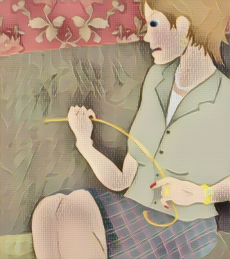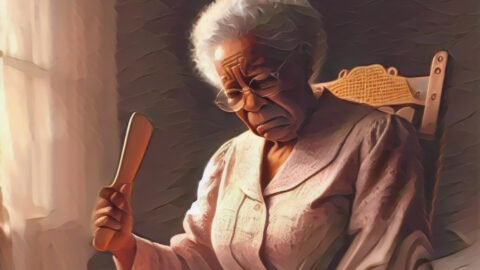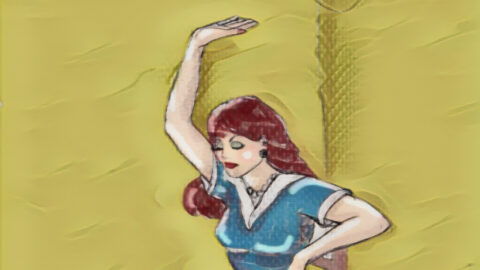The summer holidays, in those days, seemed to stretch on forever, golden and endless, like a river of sunlight winding through the weeks. That particular year, I found myself deposited at my maternal grandparents’ house, a place that felt as though it had been plucked from a gentler, older England. The air was always tinged with the scent of freshly baked bread, and the grandfather clock in the hallway ticked with a slow, dignified patience. Sunlight filtered through lace curtains, casting patterns on the wallpaper and illuminating rows of decorative plates that gleamed like treasure. I loved it there, truly, for my grandparents’ affection was as warm as a woolen blanket. Yet, there was an unspoken law in that house—a law as old as time itself. My grandparents, being upright and devout, had my parents’ full permission to discipline me should I stray from the path of good behaviour. This knowledge hovered in the air, as real and as present as the ticking clock.
(short pause) Most days that summer were bright and inviting, perfect for running wild in the garden or exploring the hedgerows. But on this particular day, the sky was a sullen grey, and rain lashed the windows with a steady, relentless rhythm. I was a boy with far too much energy, and the confinement indoors made me restless and irritable. The house, usually so welcoming, now seemed to shrink around me. My grandfather, ever patient, suggested a game of draughts, while my grandmother, Margaret, produced coloured pencils and thick paper for drawing. I tried, I truly did, but nothing could banish the gnawing boredom. I longed for the freedom of the outdoors, for the feel of grass beneath my feet and the wind in my hair.
(pause) Eventually, my grandparents turned to their daily tasks. The house filled with the gentle swish of dusters and the clinking of dishes. Left to my own devices, I discovered a tennis ball, its surface worn smooth from many adventures. At first, I bounced it quietly, the sound muffled by the thick carpet. But soon, the temptation to throw it grew too strong. I began tossing it from hand to hand, then against the wall, delighting in the satisfying smack and the way it rebounded. The living room, with its delicate ornaments and precious knick-knacks, was certainly not the place for such games, but the urge to move was overwhelming.
(short pause) It was not long before Grandmother Margaret appeared in the doorway, her expression gentle but resolute. “William, dear, you must not play with that ball in here,” she said, her voice calm and unwavering. “You might break something, and then we should both be very sorry.” I nodded, chastened, and set the ball aside, a flush of guilt rising in my cheeks. For a time, I tried to lose myself in a book, but the words danced and blurred before my eyes. The rain continued, and the minutes crept by with agonising slowness.
(pause) Restlessness returned, stronger than before. I glanced at the tennis ball, lying innocently on the table, and before I quite knew what I was doing, I was tossing it again—softly at first, then with increasing abandon. The thrill of disobedience was intoxicating, and I told myself I would be careful. But temptation and boredom are a dangerous pair for any boy. Suddenly, my hand slipped, and the ball flew off course, striking a delicate lamp perched on a side table. Time seemed to slow as the lamp wobbled, then toppled, crashing to the floor in a shower of shattered porcelain.
(dramatic pause) The sound of breaking glass was like a cannon shot. My heart leapt into my throat, and I stood rooted to the spot, staring at the wreckage. In an instant, Grandmother Margaret was at my side, her face clouded with disappointment and concern. “Oh, William,” she said, her voice heavy with sorrow, “you have been very naughty, and you know better.” Her words weighed upon me like a stone, and I felt a hot sting of shame.
(pause) She took my hand, her grip gentle but unyielding. “Come with me, William. We are going to the bathroom, and you shall receive a proper spanking.” My stomach twisted with dread, and tears pricked at my eyes. There was no escape, and the walk down the hallway felt endless, each step echoing with regret. The house, so familiar and warm, now seemed to close in around me, the ticking of the grandfather clock growing louder with every footfall. I knew, as every child of the 1960s knew, that a lesson was about to be learned in the most memorable of ways.
(gap: 2s) The bathroom was small and tiled, with a faint scent of lavender soap. Grandmother Margaret closed the door behind us, shutting out the rest of the world. She sat down on the closed lid of the toilet, her posture composed and dignified, the very image of a matronly disciplinarian. With a gentle but practiced hand, she guided me over her knee, my face burning with embarrassment and fear. The cool air prickled against my skin as she adjusted my position, ensuring I was properly situated for the lesson to come. I could see the neat row of soaps on the sink, the folded towels, the gleam of the tiles—details that would remain with me forever.
(pause) Grandmother Margaret reached for her slipper, a sturdy house shoe with a soft but unyielding sole, and held it in her hand with quiet authority. “William, you must understand that actions have consequences,” she said, her voice steady but not unkind. “This is not only for the lamp, but for disobeying when you knew what was right.” With that, she began the spanking. The first smack landed with a sharp, unmistakable sound, the slipper meeting the seat of my trousers with a sting that made me gasp. The second followed, then the third, each one measured and firm, each one a lesson in itself. By the fourth, my resolve began to crumble, and by the fifth, tears were streaming down my cheeks. The sixth and seventh smacks echoed off the tiled walls, and by the eighth and final blow, I was sobbing openly, my pride and defiance washed away in a flood of tears. Grandmother’s face remained calm, her eyes kind but unwavering, as she delivered the last, gentle admonition: “Let this be a lesson, William. Disobedience brings sorrow, but repentance brings forgiveness.”
(short pause) When it was over, Grandmother Margaret did not scold or lecture. Instead, she lifted me onto her lap, cradling me as I wept. She rubbed my back in slow, soothing circles, her voice soft and reassuring. “We love you, William, even when you are naughty. But you must learn to listen and obey.” Her words, spoken with such kindness, made my tears flow all the more. When I had calmed, she took my hands and we prayed together, asking for forgiveness and for the strength to do better. The ritual was comforting, a way to mend what had been broken—not only the lamp, but the trust between us. In that small bathroom, I learned that discipline, though painful, was always wrapped in love and the hope for a better tomorrow.
(pause) Yet the consequences of my actions lingered. At the end of the week, when my mother, Dorothy, arrived to collect me, Grandmother Margaret quietly recounted the incident. My mother’s face grew stern, and I felt the old, familiar dread return. On the journey home, she delivered a long, earnest lecture about respect, obedience, and the importance of learning from one’s mistakes. That evening, as an additional punishment, I was sent to bed early, the ache of disappointment settling in my chest. There would be no Friday sweet treat, no comforting end to the week—only the lesson, clear and unyielding, that actions have consequences, and that love sometimes means being held to account. (long pause)






























































